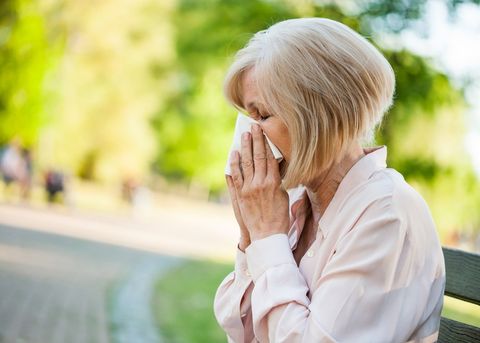Get the Relief You Need to Enjoy Your Life with Our Allergy Specialist
ALLERGY INFORMATION FROM HICKORY ALLERGY, ASTHMA & SINUS CLINIC
WHAT IS ALLERGY?
Allergy
is an overreaction of the immune system to a normally harmless substance.
Allergic individuals are often sensitive to more than one airborne allergen. Furthermore, the same airborne allergen can cause a number of symptoms. For example, inhaling pollen can trigger nasal, eye, and lung symptoms in the same individual. Another example is dust mites which can trigger respiratory symptoms as well as worsen eczema. The list above includes allergens. Cold air, exercise, viral infections, sinusitis, smoke, and other indoor and outdoor irritants can also trigger symptoms in allergy and asthma patients.
SUBSTANCES THAT CAUSE ALLERGIC REACTIONS ARE CALLED ALLERGENS.
- Pollens
- Outdoor molds
- House dust mites
- Animal dander
- Indoor molds
- Cockroach allergen
- Insect venoms
- Medications
- Food
- Latex
WHAT IS AN ALLERGIC REACTION?
The immune system responding to a FALSE ALARM and reacting to allergens that are normally harmless to most people. The immune system defends against attackers which are recognized as “foreign.” During this recognition process, the body distinguishes between its “self” and “non-self” and ordinarily does not attack “self.” An autoimmune disease is an example of the body attacking “self.” When the body identifies “non-self” molecules or a “foreign” invader, it can attack the intruder with an array of weapons. The immune system is protective when it responds to “foreign” invaders such as viruses, bacteria, fungi, and parasites. When the immune system responds to normally harmless “foreign” invaders such as house dust mites or pollen, it sets up an allergic reaction. Symptoms such as sneezing, wheezing, runny nose, or hives occur when the allergic individual is exposed to a “foreign” substance that the body falsely identifies as harmful.
CAN AN ALLERGY DEVELOP AT ANY AGE?
YES! Even though you have never experienced an allergic reaction before, the body can develop an allergy at any point in life. It is associated with the body’s recognition that the substance is “non-self” or a “foreign” invader that is harmful. The body makes specific antibodies (called IgE) against these perceived harmful “foreign” substances, such as bee venom or oak
pollen.
IS ALLERGY INHERITED?
A genetic link exists for allergy. Individuals inherit the capacity to become allergic.
| Allergic Rhinitis Medications |
| Commonly used allergic rhinitis medications. All are not listed. | |||
| Corticosteroid Nasal Sprays anti-inflammatory controller medicines | beclomethasone flunisolidefluticasone | generics | Sniff gently. Do not blow nose for 15 minutes after using nasal spray.Alternate sides between each spray, if doing more than one spray in each nostril. |
| budesonide | Rhinocort AQUA | ||
| mometasone | Nasonex | ||
| triamcinolone | Nasacort AQ | ||
| Antihistamine Nasal Spray | azelastine | Astelin | |
| Anticholinergic Nasal Spray | ipratropium | Atrovent | |
| OTC Decongestant Nasal Spray | Afrin is an example. | This category gives quick relief. However, limit the use of OTC decongestant nasal sprays to several days in a row. Chronic use leads to a rebound effect that worsens symptoms. | |
| OTC Saline Nasal Spray | Saline nasal sprays can be used as needed. | ||
| Oral Antihistamines non-sedating or low-sedating category | desloratadine | Clarinex / ReditabClarinex Syrup | These are commonly prescribed oral antihistamines. You also can get combination antihistamine and decongestant by prescription. |
| fexofenadine | TabsAllegra Suspension | ||
| levocetirizine | Xyzal Tabs | ||
| cetirizine loratadine | ZyrtecClaritin | These are now over-the-counter. | |
Contact Information





All Major insurances and Medicare and Medicaid
Business Hours
- Mon - Wed
- -
- Thursday
- - -
- Friday
- -
- Sat - Sun
- Closed
Our Location

